Why cheese, fish and flowers could all soon cost more because of new Brexit rules | UK News
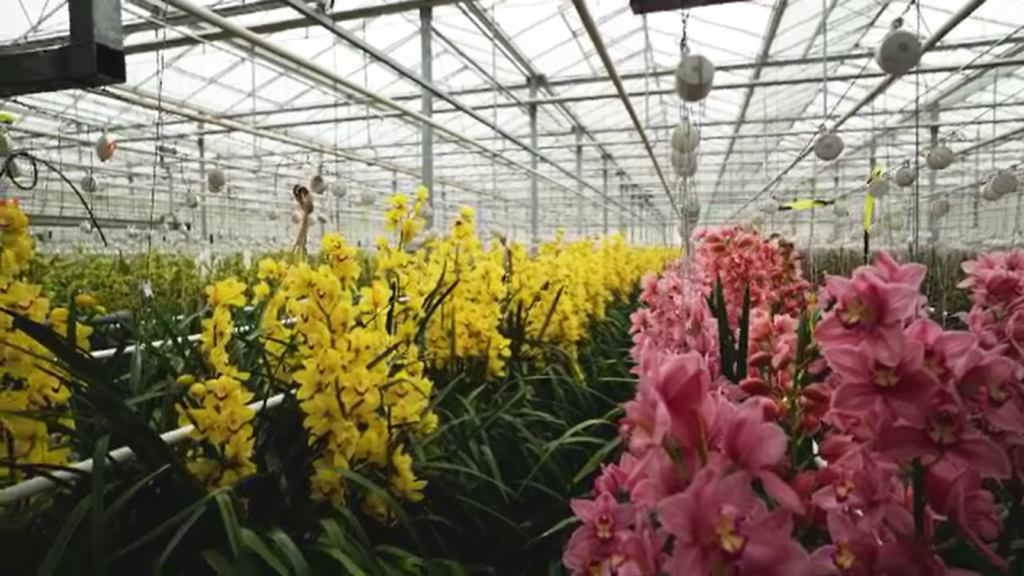
New Brexit border controls will leave British consumers and businesses facing more than £500m in increased costs and possible delays – as well as shortages of food and fresh flowers imported from the European Union.
The new rules are intended to protect biosecurity by imposing controls on plant and animal products considered a “medium” risk. These include five categories of cut flowers, cheese and other dairy produce, chilled and frozen meat, and fish.
From 31 January, each shipment will have to be accompanied by a health certificate, provided by a local vet in the case of animal produce, and, from 30 April, shipments will be subject to physical checks at the British border.
The government’s modelling says the new controls will cost industry £330m, while the grocery industry has warned that £200m could be added to fresh fruit and vegetable prices should checks be introduced in the future.
There is also the prospect of delays caused by inspections of faulty paperwork, which could derail supply chains that rely entirely on fast turnaround of goods.
British importers have told Sky News that the new rules, which have already been delayed five times in three years, will add up to 17% to shipping costs, leading to higher prices for consumers.
European companies and industry groups say the controls are unnecessary as they replicate checks already made in the EU, and that Brexit is adding bureaucracy and cost to dealing with the UK.
The new import controls are a consequence of Britain having left both the single market and the customs union when the trade and co-operation deal with the EU came into force in January 2021.
While UK exporters to Europe were immediately subject to customs rules, the British government waived import controls to avoid damaging the economy and food supply.
Read more:
UK £311bn worse off by 2035 due to leaving EU, report says
UK car production industry warns of looming Brexit rules ‘threat’
On five occasions since 2021 ministers planned and then cancelled their introduction, in part because of fears that interrupting food supplies from the EU would exacerbate the cost of living crisis.
Almost 80% of UK vegetable imports and 40% of fruit comes from Europe.
In the Netherlands, the horticulture industry has called for a further delay to controls that will impact its £1bn-a-year trade with the UK, the second largest in Europe behind Germany, which accounts for around 90% of our cut flower and plant imports.
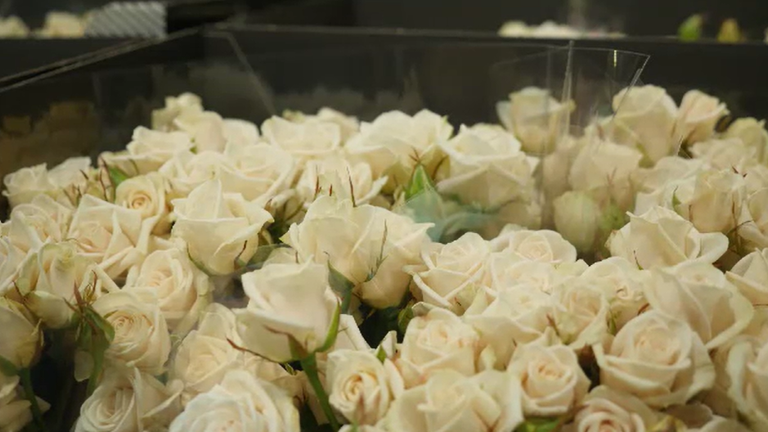
‘We’re going back in time’
Dutch flower wholesaler Heemskerk has been exporting to the UK since before it joined the common market.
The UK now requires that five types of flowers, including orchids and carnations, be checked in factories by a local inspector for two species of leaf mites that destroy foliage.
Operational director Nick van Bommel points out that the checks replicate the same processes made at the Dutch border if the plants are imported to Europe, and by his staff for trade within the EU.
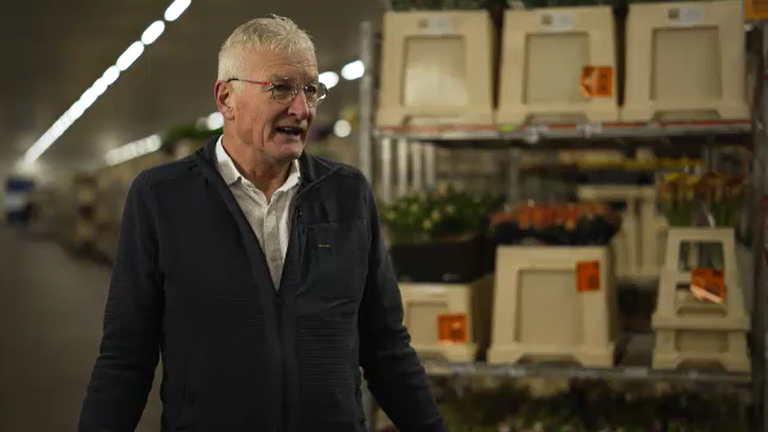
Managing director of Dutch flower wholesaler Heemskerk Nick van Bommel
“We’re going back in time. They want to have health inspections that we haven’t carried out for more than thirty years, and now from next week on we start again,” he said.
“It won’t help anybody, but it will make an awful lot of costs and somebody has to pay the bill at the end. I’m 100% sure that the last customer, the British consumer, has to pay for this.”
The Dutch association of floriculture wholesalers has asked the British government to delay the changes by another year.
Please use Chrome browser for a more accessible video player
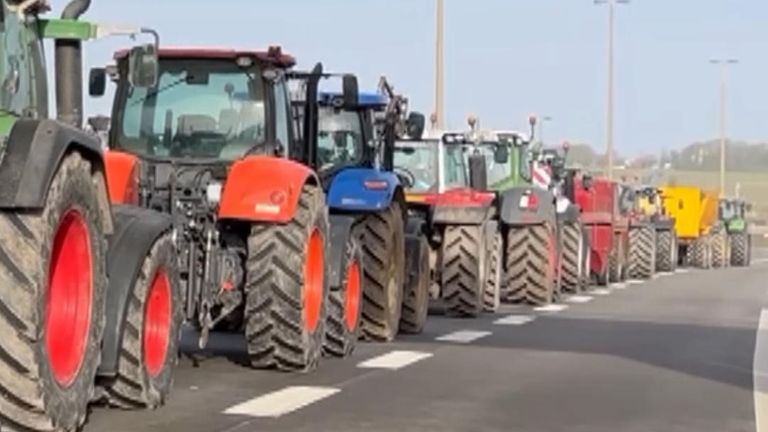
1:36
Why are farmers blocking roads in France?
Its spokesperson Tim Rozendaal told Sky News: “If Brexit was about cutting down Brussels’s red tape and bringing down costs, I don’t see the point.
“Anything that our industry has been facing since Brexit is longer red tape, additional costs and bureaucracy.”
At New Covent Garden Market in London, which receives shipments from the Netherlands within hours of flowers being cut, wholesalers are equally sceptical.
Freddie Heathcote, managing director of Green & Bloom, calculates his shipping costs will rise by up to 17% – and the knock-on to consumers could be increases of 20% to 50% once the physical inspection regime is in place.
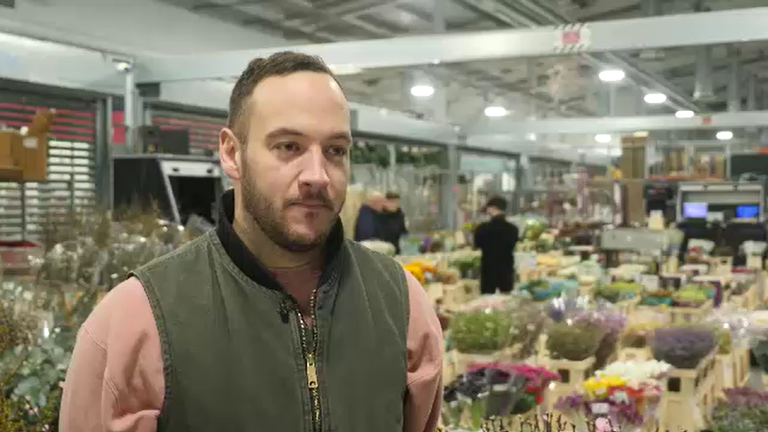
Freddie Heathcote, owner of Green & Bloom
“We have been told the charge for consignments crossing at Dover or Folkestone will be £20 to £43 per category item listed on the consignment.
“We imported 28 different consignment lines tonight from one supplier, which would be £560 to £1,204 to clear the border control point on a total invoice of £7,000. That’s between 8% and 17% additional cost on an average import for us.”
The food industry is concerned too.
Patricia Michelson, founder of London cheese chain La Fromagerie, has been importing artisan cheese from across Europe for more than 40 years. She is concerned that the cost and hassle of sourcing veterinary checks in Europe will dissuade some suppliers.
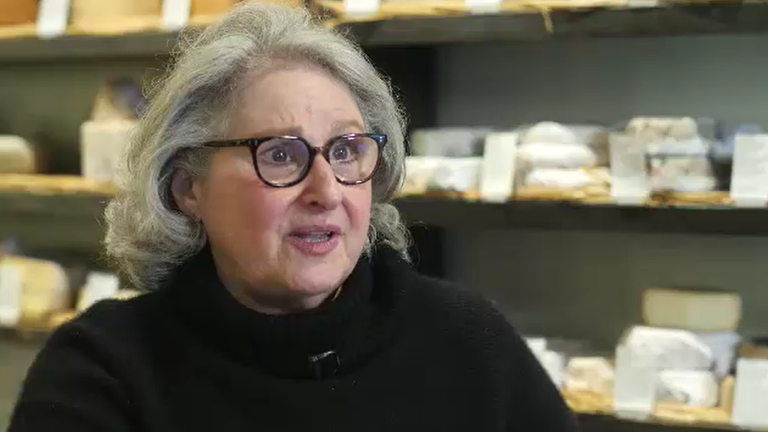
Patricia Michelson, founder of London cheese chain La Fromagerie
“We deal with suppliers who are one or two guys in a dairy with 50 or 100 sheep or 20 cows. Do they want to be paying for this new certificate to send to us?
“I assure you that most of them will say no. So the onus is on us… that means another extra cost, on top of all the costs so far to bring the produce in.”
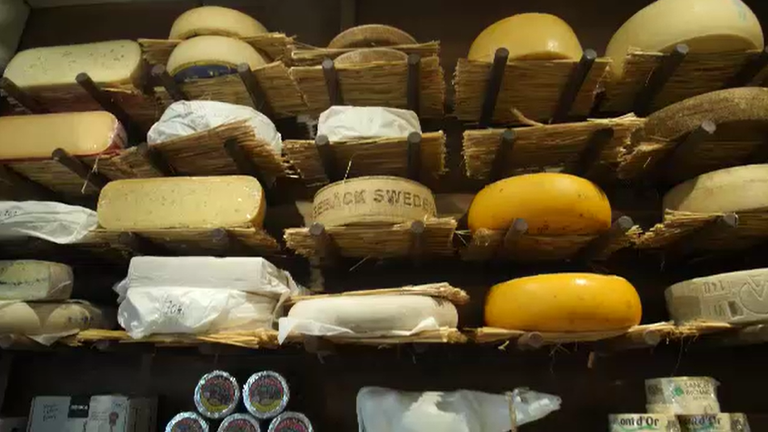
La Fromagerie
‘Disturbing confusion’
After months of preparation this week the Department of Environment, Food and Rural Affairs added a host of common fruit and vegetables to the list of medium risk produce.
It initially said the produce would only face physical checks from October, but 48 hours later changed the rules again, saying they would give three months notice when health declarations and physical checks are required.
The late change attracted criticism from leading trade body the Institute of Export and International Trade.
“The confusion caused by the announcement… is disturbing, particularly at a point when significant changes are being planned for the general operation of the UK border,” said its general secretary Marco Forgione.
A government spokesman said: “We are committed to delivering the most advanced border in the world. The Border Target Operating Model is key to delivering this, protecting the UK’s biosecurity from potentially harmful pests and diseases and maintaining trust in our exports.
“We are taking a phased approach – including initially not requiring pre-notification and inspections for EU medium risk fruit and vegetables and other medium risk goods – to support businesses and ensure the efficient trade is maintained between the EU and Great Britain.”
Recent Posts
- Hanny: Hidupmu untuk Matimu, Banyaklah Bersyukur.
- Kuoni extends out-of-date range flights to more destinations
- Fred Olsen Cruise Lines ship makes Newcastle debut
- Agent Diary: Wildlife experiences are a big draw – be sure to sell only the ethical ones
- Virgin Atlantic plans electric air taxi service for UK







Recent Comments